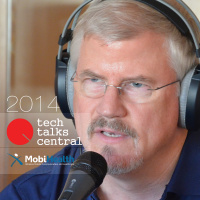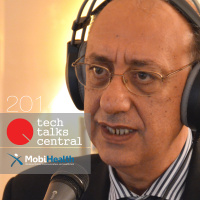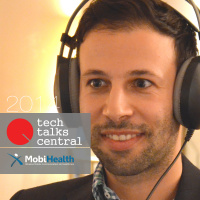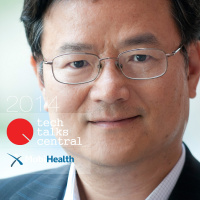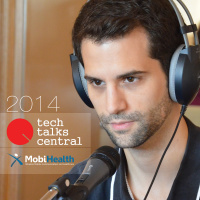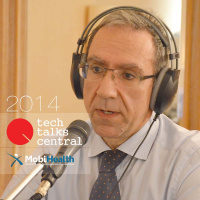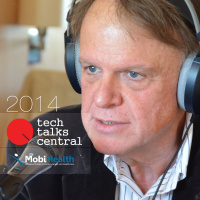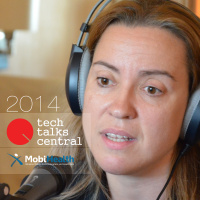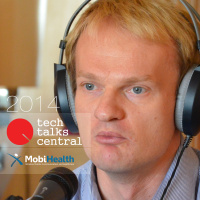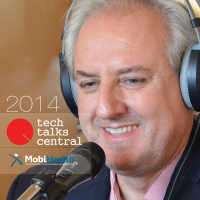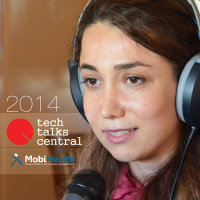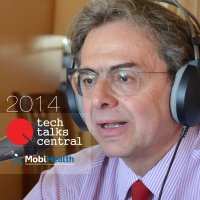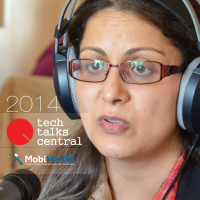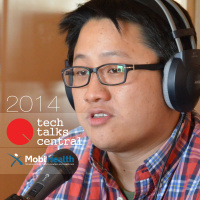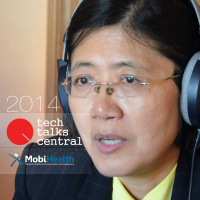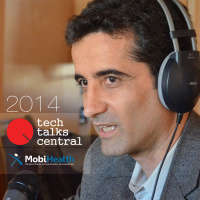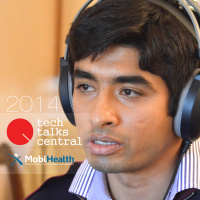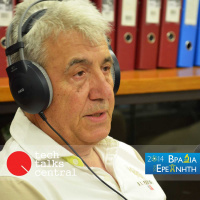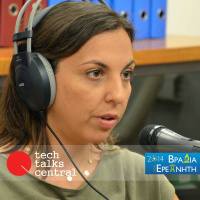Sinopsis
The Tech Talks Central web radio covers all the hot topics and trends in the connected world and features interactive interviews with thought leaders, as well as movers and shakers of the tech industry.It’s a joint venture between entrepreneurs working in the mobile and technology field and people who love the radio waves!
Episodios
-
TTC #104 Beyond “wearables” and quantified-self, Michael Dillhyon
14/11/2014 Duración: 25minMichael Dillhyon, President of Vital Connect Europe, is a professional with an outstanding track record in leading, founding and advising businesses in the fields of life sciences, biosciences, eHealth. We talk about recent advances in health-patches - tiny self-powered adhesive devices that can be placed directly on the patient’s body for non-invasive, continuous, remote monitoring of several vital signs and metrics. In the second part of our discussion we talk about the tidal wave of change on our every-day perception of health, fitness and health - a change powered by the convergence of several disciplines and underlined by what we call Human Analytics. Interviewed by George Voulgaris for Tech Talks central.
-
TTC #107 HPV Guard - a software management platform for cervical cancer, Prof. Petros Karakitsos
14/11/2014 Duración: 12minProf. Karakitsos explains how HPV Guard, a smart and innovative system to define individual risk for cervical cancer development, works. This brand new platform, supported by an EU Grant, Greek State money and private investments, compiles -using established know-how of Big Data mining- laboratory and clinical data that feed a dedicated scoring system, with specialist doctors analyzing the results. Interviewed by Yannis Rizopoulos for Tech Talks Central.
-
TTC #108 Personalized health-care using pervasive systems, Dr. Andreas Triantafyllidis
14/11/2014 Duración: 15minCurrent healthcare practices and technologies are limited what it comes to offering a treatment that is personalized and optimized for the individual patient. The reasons are not only due to current technology limitations of legacy systems but also due to operational practices and economics. Dr. Andreas Triantafyllidis, a PostDoc Research Scientist at the Institute of Biomedical Enginnering at the University of Oxford, talks about the ongoing research in using pervasive systems to achieve better, personalized patient monitoring and treatment. Using pervasive systems, combining remote monitoring, mobile technologies and focusing on optimizing user-interaction and user-experience with the system the aim of the research is to remove barriers and to drive adoption and retention by both patients and health-care professionals. Interviewed by George Voulgaris for Tech Talks central.
-
TTC #109 Your brain as the ultimate controller, Prof. Bin He
14/11/2014 Duración: 16minThe field of non-invasive Brain Computer Interfaces (BCI) is gaining massive momentum as startups, companies and researchers are pushing hard. The race on BCI research is on improvement of the efficiency and the accuracy of the systems, while some of the first commercial efforts are testing the waters with several affordable devices already available to consumers. Professor Bin He, a pioneer in the field of Biomedical Engineering, talks about the ground-breaking research currently being done at the University of Minnesota in decoding brainwaves more accurately and reliably using non-invasive interfaces. We discuss the already impressive results of a brain-controlled helicopter experiment, some of the present challenges and the upcoming breakthroughs in the field of Brain Computer Interfaces. Interviewed by George Voulgaris for Tech Talks central.
-
TTC #111 Creating machines with empathy, Javier Hernandez
14/11/2014 Duración: 16minWhat if you could see what calms you down or increases your stress as you go through your day? What if you could see clearly what is causing these changes for your child or another loved one? Javier Hernandez is currently working towards his Ph.D. at the MIT Media Lab investigating Affective Computing: the field of using sensors and computers in order to interpret feeling and emotion. Starting from the current experiments at MIT Media Lab using off-the-shelf Google Glasses as the human-computer interface, we are talking about the importance of being able to provide immediate/real-time feedback to the user and the repercussions in diagnostic, motivational/gamified experiences. Interviewed by George Voulgaris for Tech Talks central.
-
TTC #110 Potentials of miniaturized Smart Systems in healthcare, Dr. Andreas Lymberis
14/11/2014 Duración: 13minVeteran Program Officer, Dr. Lymberis, explains the many ways European Commission employs to support enterprises and SMEs in particular, that focus on nano- microelectronics and smart systems/apps, used mainly in the healthcare sector. Through new programs that are innovative and greatly adapted to their special needs, niche players may now submit proposals and get support for the design and development of prototypes; responding to competitors and narrowing the gap with USA or Far East countries. Interviewed by Yannis Rizopoulos for Tech Talks Central.
-
TTC #112 CFPG micro-energy harvester for wearable medical sensors - Prof John Baras
14/11/2014 Duración: 10minThe highlight of Prof. Baras’ interview is that “if the 20th century was the century of ICT, then the 21st century surely is the century of Medicine”! Being a technology- Renaissance man himself, he believes that the next frontier is disease modelling (like diabetes or Alzheimer); he and his team give answers on a broad spectrum of applied technology issues focusing on revolutionary micro-energy harvesters that exploit the value-added of human body movements to power sensors and many other mobile devices, in the future. Interviewed by Yannis Rizopoulos for Tech Talks Central.
-
TTC #114 Open Data in Healthcare, Evika Karamagioli
14/11/2014 Duración: 11minEvika Karamagioli starts out with why data should be open and what their value is when combined with public policies. We ask her who will analyse efficiently this data and what the challenges are in collecting this data; who profits from it and what kind of scientists should be responsible to analyse it. She insists on citizen participation and how they should be trained to understand and access the data whether it be their own or society’s in general. She explains what the Ideatopos 2015 conference is about and how its purpose is to link technological excellence with social innovation by creating meaningful services for citizens and opening up a dialogue about citizens, policies and ICT. Interviewed by Vicki Kolovou for Tech Talks Central.
-
TTC #115 Antennas, the hidden hero of wireless technologies, Dr. Will Whittow
14/11/2014 Duración: 12minAntennas are at the very heart of our wirelessly connected world. Technology advances have completely miniaturized and concealed them to the point that people tend to forget that they exist! Antenna research is hotter than ever with applications like wearable and embroidered antennas which give birth to terms like “functional fashion”, more efficient energy harvesting which enables inductive powering in more situations and the study and analysis of specific absorption rates (SAR) which are directly related to the effect of wireless devices on our health. Dr Will Whittow, Senior Lecturer in Electronic Materials Integration at Loughborough University, talks about the current challenges being addressed and some of the ground breaking research that takes place in the field of antenna technologies. Interviewed by George Voulgaris for Tech Talks central.
-
TTC #113 Mobile in health - solutions for elderly and kids with ADHD, Dr. Panagiotis Bamidis
14/11/2014 Duración: 15minThere are many consumer- and healthcare- grade solutions aiming to improve the quality of life for the elderly, however ease-of-use and intrusiveness are two of the most common factors hindering effectiveness and wide adoption. Dr. Panagiotis Bamidis, Assistant Professor at the Aristotle University of Thessaloniki talks about the current research in Affective and Physiological computing aiming to improve the cognitive and physical condition of elderly people using gamified experiences through a number of consumer devices such as mobile phones, smart TVs etc. Dr. Bamidis then talks about current work in another research area which aims to help young kids with Hyperactivity or Attention Deficit Disorders by providing a far more effective mobile-based activity monitoring framework than existing practices. Finally we talk about some early stage research in Body Machine Interfaces. Interviewed by George Voulgaris for Tech Talks central.
-
TTC #120 Development of low-cost smart training pants (STants), Sarvenaz Salehi
14/11/2014 Duración: 10minMrs. Salehi gives a thorough description of the smart training pants that DFKI (German Research Center for Artificial Intelligence) has designed and already produced as a working prototype. A most characteristic example of real “wearables”, these pants contain an array of sensors that send continuously via Bluetooth information to a designated mobile device about the vital statistics of the user ie. that could be an athlete, soldier or patient. Interviewed by Yannis Rizopoulos for Tech Talks Central.
-
TTC #119 Gamification in fitness & health, George Veinoglou
14/11/2014 Duración: 11minMr. Veinoglou talks about loyalty schemes and gamification – a hot issue in health, as it can be used in many sectors and in different ways; how he motivates organizations and enterprises in Greece, as well as abroad, to use the techniques. As every case has its own needs and requirements, the platform solution (or, rather the framework) proposed by Icon Platforms is a modular one, that may be shaped and transformed in the most suitable way. Interviewed by Yannis Rizopoulos for Tech Talks Central.
-
TTC #117 Monitoring of oral chemotherapy patients at home, Prof. Reem Kayyali
14/11/2014 Duración: 11minDr. Kayyali explains the benefits of CANadvice, an Android mobile application tested in 2014 in UK and used by patients receiving oral chemotherapy at home, in order to alert their doctors about possible quite painful side-effects, while undergoing treatment. She also speaks about Welcome, a European project which is in essence a monitoring system for pulmonary diseased patients, based in the cloud. Interviewed by Yannis Rizopoulos for Tech Talks Central.
-
TTC #118 Using Body Sensor Networks for end-to-end pervasive sensing, Dr. Benny Lo
14/11/2014 Duración: 17minIn this interview we talk with Dr. Benny Lo, Lecturer at the Hamlyn Centre, Imperial College London, about the current research in the field of Body Sensor Networks. The focus is on using small sensors, often in the form of pervasive wearable devices, for continuous monitoring of patients. The research is concerned with the entire end-to-end system from sensor hardware, operating system, analytics all the way to the actual clinical trials. At the second half of the interview we discuss a few of the big trends in healthcare innovation as these are shaped by some of the major and, to some extent, diverse commercial and non-commercial driving forces. Interviewed by George Voulgaris for Tech Talks central.
-
TTC #121 How Data and Data Analytics change healthcare, Dr. May D Wang
14/11/2014 Duración: 20minData is changing healthcare. Health information systems deal with the entire pipeline of health related data from data capture/acquisition, information extraction, Data analytics and interpretation, presentation and decision support. We had the opportunity to talk with a distinguished guest Dr May D. Wang, Associate Professor at Georgia Institute of Technology and Emory University. In the first part Dr Wang gives an overview of the role of data in healthcare and some of the key challenges in adopting and exploiting the benefits of new information systems in healthcare. We talk about the increasing role of personal and personalized healthcare solutions, the stakeholder landscape and the importance of managing change in legacy healthcare environments and ecosystems. At the last part of this interview Dr. Wang talks about the extensive educational and training activities that are currently in progress: from online Master-level courses in bio-medical data analytics for young scientists to patient training and hos
-
TTC #122 Maximizing output power of a CFPG micro-energy harvester, Dr. Kamran Sayrafian
14/11/2014 Duración: 12minDr. Sayrafian talks about the next big thing in our lives, wearable and implantable sensors, used mainly in mobile health. He explains how we can power them with energy from microharvesters that exploit the natural movement of our body, producing energy proportional to their size, and reveals a user-centric and quite challenging vision for health future: patients and seniors living better at home and away from the hospital, yet better monitored and cared of. Thanks to modern health services that follow them everywhere. Interviewed by Yannis Rizopoulos for Tech Talks Central.
-
TTC #124 Antennas as an integral part of Sensors, Dr. Akram Alomainy
14/11/2014 Duración: 18minDr. Akram Alomainy explains what cognitive radio is, how it senses and learns from environment and why it’s important for the most effective results. He talks about ink-jet printed antennas, antenna flexibility and how they can be part of textiles. His research focuses on creating very small and flexible antennas without losing efficiency and how their application in health services can help patients and personnel in linking everything for medical assessment. Dr. Akram Alomainy is a very passionate and eloquent speaker with a very clear image of his research and the future. He mentions his research on the light spectrum, specifically on bending light and why he wants to research more on cognitive antennas by creating a device that will do everything in one. Interviewed by Vicki Kolovou for Tech Talks Central.
-
TTC #123 Wearable sensors to create person-centered healthcare, Dr. Kunal Mankodiya
14/11/2014 Duración: 15minDr. Kunal Mankodiya explains his focus on creating “a wearable platform” to collect contextual data (rather than continuously record information) in real time, combining wearable sensors and smart devices. He talks about creating intelligent algorithms to process and store only relevant data. Dr. Kunal Mankodiya presents his SPARK- wearable sensor and smartwatch project currently in clinical trials with Parkinson’s patients. He also introduces us to parallel projects and his collaboration with Dr.Neil Ryan psychiatrist at the University of Pittsburgh, to develop a neuroelectronic system that leverages functional near-infrared spectroscopy (fNIRS) a noninvasive cerebral oximetry monitor to map brain activity. His goal is to diagnose patterns of emotions and ultimately the understanding of mental illness. Dr. Mankodiya contemplates the possibilities of intervention in neurodegenerative diseases through wearable sensors. Spoiler Alert: he also hints at developing inertia sensors in women’s high heel shoes, to c
-
TTC #93 Nanomaterials for Energy applications
04/09/2014 Duración: 24minDr. Dimitris Niarchos, researcher and former director and president of NCSR Demokritos has a rich publication history and a dual set of activities under his belt. As a researcher in Materials science, magnetism and superconductivity, nanotechnology, meta-materials, hydrogen history and high frequency magnetodielectrics he explains the 3 directions his team’s research is moving in and how close it is to industrial production. As a former administrator he gives us his insights on the research sector in Greece and what needs to be done for the field to thrive. Interviewed by Vicki Kolovou for Tech Talks Central.
-
TTC #92 Laser-matter interaction: environmental, energy and technological applications
04/09/2014 Duración: 13minDr. Kandyla, from the National Hellenic Research Foundation, describes how she and her team use laser radiation as a nanotechnology tool for developing nanostructured materials and devices with advanced functionalities, which may be used in many ways - two of them (perhaps, the most commercially viable) are the development of thin film solar cells and chemical sensors which are useful for monitoring toxic and dangerous gases employed in industrial and domestic applications as well as trace gases contained in the human breath, for early and (most important) non-invasive early detection of diseases. Interviewed by Yannis Rizopoulos for Tech Talks Central.

